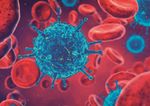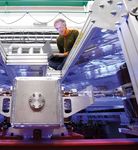Johannes Gutenberg University Mainz - Johannes Gutenberg University Mainz 55099 Mainz www.uni-mainz.de
←
→
Page content transcription
If your browser does not render page correctly, please read the page content below
Johannes Gutenberg
University Mainz
Johannes Gutenberg University Mainz
55099 Mainz
www.uni-mainz.de
1 1Creative minds shape the culture of
knowledge at Johannes Gutenberg
University Mainz (JGU). At JGU, more than
40,000 staff and students from over 120 nations take
on the challenges of the sciences and the arts, of
research, learning, and teaching every single day.
United in doing research and learning, living and
working at JGU, they all make our university so
successful – thanks to their diversity of talents, their
innovate ideas and their creativity, their curiosity
and commitment as well as their will to transcend
the boundaries of knowledge we all encounter
day by day among disciplines and academic
cultures, among generations, nations, cultures, and
institutions. JGU supports its members in all this –
in line with the university’s namesake, Johannes
Gutenberg, and its motto, THE GUTENBERG SPIRIT:
MOVING MINDS – CROSSING BOUNDARIESWe want to inspire young people to courageously cross the
diverse boundaries of knowledge they encounter every day.
f.l.t.r.: Professor Franz Rothlauf Chief Information Officer (CIO), Professor Stefan Müller-Stach Vice President for Research and Early Career Academics,
Professor Georg Krausch President, Professor Stephan Jolie Vice President for Learning and Teaching, Dr. Waltraud Kreutz-Gers Chancellor
In our era of digitalization and globalization, just worldwide for its achievements in the world of management on strategic matters and promote In what aspects does the university need to
as in Johannes Gutenberg‘s time, knowledge and sciences and the arts, in research and teaching as well individual excellence. Other exemplary projects change to make sure it can adequately prepare
innovation are key to the future viability of our as for its dialog with politics, business, and society. include the so-called Mainz Model of Quality an increasingly heterogeneous student body to
society. For Mainz University, founded in 1477, the Management, systematic HR development, and the assume responsibility in society?
generation of knowledge as well as the sustainable Over the past decades, we at JGU have taken account establishment of a campus-wide JGU leadership How do we attract the best minds in the face
exchange of new insights and their practical of the far-reaching structural changes in the higher culture – to name just a few. As the home of experts of international competition? And how can we
implementation have for centuries guaranteed the education landscape by initiating and implementing from many fields, JGU benefits from the extensive guarantee that outstanding academics will
university’s success and social relevance. And this comprehensive internal modernization and reform know-how of all its members actively shaping and have the freedom and space they need for their
has been particularly true for its most recent history. processes. JGU‘s innovative university governance improving our university. research?
strategy in particular has received national and What role will the university play within the
Reopened in May 1946, Johannes Gutenberg international attention. Various measures and projects We at JGU are already working on the issues of the European science system of the future?
University Mainz has since become one of the most have set new standards, such as the establishment years and decades to come:
eminent German universities at the heart of Europe. of three excellence centers for research, teaching, Jointly addressing these questions and developing
Today, more than 70 years later, JGU is recognized and young researchers, which advise the university solutions, we make valuable contributions to the on-
going strategic development of JGU.Johannes Gutenberg University Mainz In an internal strategy process, JGU has defined
has gained worldwide recognition as its world-class research activities in terms of top-
one of Germany’s outstanding research- level and high-potential research areas. Top-level
led universities. As a comprehensive university, areas are internationally established work groups
JGU offers its approximately 4,400 academics – whose outstanding achievement in future-oriented
including 580 professors – plenty of opportunities research fields have resulted in an excellent academic
for collaboration in interdisciplinary research. It reputation. High-potential research areas, on the
maintains close ties with regional, national, and other hand, have been established to open up and
international partners in research, business, and explore new, innovative fields of research that could
culture. make a significant contribution to the profile of the
university in the future.
JGU has demonstrated its research strength through
its success in the German Excellence Strategy This profile building is continuously supervised by
program. The PRISMA+ Cluster of Excellence on the Gutenberg Research College (GRC). As a body
Precision Physics, Fundamental Interactions, and of interdisciplinary experts, the GRC is the central
Structure of Matter is at the forefront of research in strategic institution responsible for promoting top-
its field. JGU‘s outstanding research achievements level research and fostering increased networking
are also confirmed by excellent ratings in national of the various outstanding fields of research at JGU.
and international rankings. It guarantees highest scientific standards at the
university.The Standard Model of particle physics defines the known basic building blocks of matter and the forces acting between them with impressive accuracy. The Higgs particle, first detected in 2012, was the last missing piece. Researchers at Mainz played a significant role in its discovery. Despite its precision and the fact that it explains so much, the Standard Model does leave certain fundamental questions unanswered. In fact, observations have been made that indicate the possible existence of previously unidentified particles and fundamental forces beyond the Standard Model. The aim of PRISMA+ is to search for this "new physics". In doing so, the research program focuses on increasingly precise measurements: The construction of the MESA electron accelerator at JGU will facilitate experiments of unprecedented accuracy, putting the Standard Model to the test. Furthermore, researchers are increasing their focus on the world of weakly interacting particles, perhaps the most exciting challenge facing fundamental physics this century. Of particular interest in this context are the mysterious dark matter and the enigmatic neutrinos. The construction and operation of innovative large-scale facilities on the Gutenberg campus, JGU‘s significant participation in inter- national large-scale experiments, and ground-breaking and well- supported research in the field of theoretical physics: This unique combination makes Mainz an important research hub of international particle, astroparticle, and hadron physics.
Materials sciences have been a successful field of TopDyn | Topology and Dynamics research at JGU for many years – with a number of Topology is a mathematical field that can be used large third-party funded research projects as well to describe certain properties of materials. TopDyn as various Collaborative Research Centers (CRCs) scientists are researching, among other things, funded by the German Research Foundation. special magnetic structures that may be suitable as Materials research at JGU focuses on the following information carriers for future storage devices. main branches: (1) spintronics, which is concerned with the intrinsic angular momentum (or spin) of SusInnoScience | Sustainable electrons and its potential use for data storage; Chemistry as the Key to Innovation in Resource- (2) polymer research, which serves, among other efficient Science in the Anthropocene things, to produce new drug carriers for tumor therapy SusInnoScience research aims at finding sustainable in medicine; (3) the development of sustainable chemical methods for raw material supply, energy synthesis processes for producing various materials conversion, material development, and production by way of electrochemistry and photochemistry; processes. In doing so, SusInnoScience is dealing (4) research into so-called soft matter such as liquid with one of the most pressing problems of mankind. crystals and the subsequent development of novel materials.
Johannes Gutenberg University Mainz has evolved as an internationally renowned hub for biomedical research with a strong life sciences campus. Over the last couple of years, the university has reoriented and restructured its Biology department – in close collaboration with the Mainz University Medical Center and other adjacent disciplines such as the materials sciences with their active substance research. Collaborating with neighboring non-university research institutions – the Institute of Molecular Biology (IMB), the Institute of Biotechnology and Drug Research (IBWF), the Helmholtz Institute for Translational Oncology (HI-TRON), and the Leibniz Institute for Resilience Research (LIR) –, the clear focus is on future-oriented aspects of biological and medical research. ReALity | Resilience, Adaptation and Longevity Why do some people stay healthy into old age, while others develop degenerative diseases early on? What are the reasons for large differences in life expectancy? What makes our brain, heart, or immune system resilient to stress for longer periods of time? ReALity researchers aim to understand the processes that give biological systems stability and make them resistant to changing environmental influences.
Mainz University is a world leader in the field of M3ODEL | Mainz Institute of Multiscale
simulation-driven sciences. The high-performance Modeling
computer MOGON II, for example, was one of the How can computers calculate the properties of
fastest 100 supercomputers in the world when it new, ecologically-friendly materials, predict the
was commissioned in 2017. potential damage of earthquakes, or improve
weather forecast? The M3ODEL research project
aims to develop new methods to answer this kind
of questions.
Human history in the spotlight: The JGU Challenges | 40,000 Years of Human Challenges:
Institute of Ancient Studies with its six Perception, Conceptualization and Coping in Premodern
divisions and numerous international Societies
research groups is one of the largest How did individuals and communities deal with different
cooperative bodies of its kind in Germany. challenges in the past? The Challenges research project aims
to provide answers and thereby enrich current discussions,
such as on migration and social change and transformation.As a comprehensive university, Johannes Center have continuously developed their range of
Gutenberg University Mainz offers a services. In 2018, JGU was awarded the Genius Loci
broad range of subjects from Accounting Award for Excellence in Teaching, recognizing the
and Finance to World Literature. Furthermore, JGU university‘s efforts and success in student support
encourages and supports learning and teaching services.
across subject boundaries: With 75 subjects to
choose from in various combinations, JGU offers To ensure a high quality of teaching, JGU is constantly
more than 260 degree programs to its about 30,000 enhancing its teaching strategy: Innovative forms
students. of academic teaching, new learning concepts, and
committed teaching staff are seen as key factors
JGU cherishes the diversity of its students and aims for successful learning and teaching. The strategic
at making them feel comfortable and supported process is continuously monitored by the Gutenberg
during their studies. The university accompanies Teaching Council (GTC) as JGU‘s central expert
the entire student life cycle with a full range of committee for the promotion and consistent further
high-quality services – from student counseling development of teaching and academic teaching
and application through enrollment and course competence.
registration to graduation and the start of
professional life. There are student advising offices Mainz University has taken the right course: JGU
in all faculties, the subject-specific advisory services provides its students with a high-quality curriculum,
have adapted their consulting to the requirements a vibrant social and cultural network as well as an
of a diversified student body, and the Central inspiring and transparent learning environment
Student Advisory Service as well as the JGU Career focused on student success.Mainz University embodies the European idea of freedom, common
values, and fairness in its about 1,000 alliances with 350 European
partner universities in the Erasmus Program. JGU educates its students
to become open-minded and responsible global citizens, and reflects
and appreciates internationality and interculturalism in its research and
teaching – as European University in the ForThem alliance. This network
of seven European universities, coordinated by JGU, implements new
dimensions of cooperation in European higher education. The alliance
aims at making tangible the European model of an open society and
of the exchange of knowledge in universities in all its creativity and
liveliness – for our students, for the next generations, for our society:
For Them.
Selected by the European Commission in 2019, the ForThem alliance
is one of the pioneers in the European Higher Education Area. The
network brings together universities from the north, south, west, and
east of Europe and aims at significant improvements in exchange,
collaboration, and mobility among students, teaching staff, researchers,
and research support staff within the EU.
Johannes Gutenberg University Mainz considers the opportunities to go abroad for a certain period
international orientation of its courses, its global of time during their course of study so that they Offering additional integrated international courses and degree
network of teaching collaborations as well as its many can attend a university in another country or take programs is one important step towards a European Campus. This gives
student exchange programs to be the best means for language courses. At the same time, students and students the chance to learn at JGU as well as at one, two, or even more
preparing JGU students to cross national borders, to lecturers from all over the world are welcome at JGU. JGU partner universities abroad. With their graduation from JGU, they
encounter other cultures, and to transcend cultural More than 4,000 foreign students contribute to the also receive a full degree from the partner university or a multinational
boundaries. JGU offers its students many different international flair at Mainz University. joint degree.These structured programs include, for example: JGU‘s successful support for doctoral students,
The Gutenberg Academy – an exclusive mentoring postdocs as well as those working towards a
program for JGU‘s 25 most promising doctoral habilitation are bundled together in the Gutenberg
candidates and young artists; Council for Young Researchers (GYR). This
Doctoral programs such as the Max Planck committee of experts from various disciplines and
Graduate Center with Johannes Gutenberg at differing qualification levels advises the university
University Mainz (MPGC), a joint institution of the management on strategic issues and helps to create
Johannes Gutenberg University Mainz and externally funded junior research groups and three natural science faculties and the Medical optimal conditions for young academics at JGU.
considers sustainable support for young numerous talented artists and musicians. In addition Center of JGU and the two Max Planck Institutes The GYR also serves to structure and communicate
researchers and artists one of its core to providing for individual pathways to a doctorate, in Mainz. The MPGC gives creative young doctoral existing funding formats as well as to develop new
responsibilities. Around 600 to 700 young academics Mainz University offers interdisciplinary structured students an early opportunity to work across ones. It aims at the sustainable improvement of
receive their doctoral degrees at JGU every year, some programs for young academics – from the early disciplines in wider research contexts. This talent the working and supervision conditions of young
35 postdoctoral researchers obtain a postdoctoral stages of the doctorate to the advanced postdoctoral factory is exemplary for the whole of Germany and academics and the provision of individual support
lecturing qualification, and another 50 are appointed phase. provides for an innovative quality of collaboration services.
to junior professorships. There are also independent in research and graduate training.Since 2007, the strategic profile building in science and research is
bearing fruit at the Mainz science hub: The number of federally co-
financed research institutions in the immediate vicinity of JGU has
tripled – and new grounds in terms of institutional collaboration have been
broken with the establishment of the Max Planck Graduate Center with JGU, the
Helmholtz Institute Mainz, and the Institute of Molecular Biology. Furthermore,
two Max Planck Institutes, three Leibniz Institutes, one other Helmholtz
Institute, and a Fraunhofer Institute complement the high-performance
research landscape at Mainz.
With almost 4,000 scientists, these research institutions together build the
network of the MAINZ RESEARCH ALLIANCE. Their dynamic and continuous
generation of knowledge, collaboration, and exchange as well as their transfer
of knowledge and technology into business and society is the foundation of
the Mainz science hub.
Institute of Molecular Max Planck Institute for Leibniz Institute for
Biology (IMB) Chemistry Resilience Research (LIR)
Helmholtz Institute Mainz Max Planck Institute for Leibniz Institute of
(HIM) Polymer Research European History (IEG)
The trilateral Rhine-Main Universities (RMU) alliance: In 2015, Goethe University
Helmholtz Institute for Fraunhofer Institute for RGZM –
Frankfurt, Johannes Gutenberg University Mainz, and Technische Universität Translational Oncology Microengineering and Leibniz Research Institute
Darmstadt signed a cross-border framework agreement intended to further Mainz (HI-TRON) Microsystems (IMM) for Archaeology
promote and intensify their collaboration. The strategic RMU alliance allows them
to collaborate in all areas of higher education, in strong research alliances, and in
creating a common study area. In doing so, the Rhine-Main Universities contribute to
the lively and innovative Frankfurt/Rhine-Main science region in the heart of Europe.Almost all JGU institutions are located
on the Gutenberg campus in close
vicinity of the Mainz city center. Here
you find libraries and labs next to student dorms
and child daycare centers, sports facilities and
cafés. Music, film, and theater events, lectures
and exhibitions make our Gutenberg campus
a place of lively academic culture. And all year
round, our Botanic Garden invites those seeking
peace and quiet.Our Gutenberg alumni are part of the history,
the present, and the future of our university.
They all are JGU ambassadors linking research
and application, the lecture hall and the working world,
the Gutenberg campus and their place of work and
living. Our Gutenberg network brings alumni, partners,
and friends of Mainz University together – and connects
them with today‘s students, teachers, scientists,
and staff. Mainz University and all its members thus
benefit from a lively, cross-generational community –
in accordance with the motto that JGU adopted at its
reopening in 1946:Publisher The President of Johannes Gutenberg University Mainz, Professor Georg Krausch, 55099 Mainz Concept and editors Petra Giegerich, Martina Stöppel Press and Public Relations Design Tanja Labs, www.artefont.de Printing PRINZ-DRUCK Print Media GmbH & Co KG Printed copies 300 Publication date November 2020 Photo credits cover: Alexander Sell/JGU | content: Thomas Hartmann/ JGU | p. 5 AlexanderSell/JGU | p. 6 JANA Kay/JGU | p. 8 Alina Grubnyak/Unsplash.com | p. 9 Thomas Hartmann/ JGU | p. 11 Thomas Hartmann/JGU | p. 12 Rafe Swan/Getty Images. com | p. 13 Eric Lichtenscheidt/JGU | p. 15 nobeastsofierce/ shutterstock.com | p. 16 Werner Feldmann/HIM, Hit1912/ shutterstock.com, graphicINmotion/shutterstock.com, Research group of Professor Boris Kaus/JGU | p. 17 Alexander Sell/JGU | p. 18 Alexander Sell/JGU | p. 20 SDI Productions/GettyImages.com | p. 21 newco500/123rf. com | p. 22 Clerkenwell/GettyImages.com | p. 23 sturti/ GettyImages.com | p. 24 Hinterhaus Productions/ GettyImages.com | p. 25 f.l.t.r. Thomas Hartmann/JGU, Thomas Hartmann/JGU, Martina Stöppel/JGU, Alexander Sell/HIM, Carsten Costard/MPI-P, Kathrin Schieferstein/ Leibniz Institute of European History, Peter Pulkowski/Mainz University Medical Center, Tobias Hang/Fraunhofer IMM, Bernhardt und Partner Architekten Darmstadt/RGZM | p. 26 Thomas Hartmann/JGU, Alexander Sell/JGU, Hinterhaus Productions/GettyImages. com, Saron Duchardt/JGU, Peter Pulkowski/JGU, Stefan Gutmann/Studierendenwerk Mainz, Alexander Sell | p. 27 Thomas Hartmann/JGU, Lordn/ shutterstock.com, Thomas Hartmann/JGU, Alexander Sell/ JGU, Saran Duchardt/JGU, David Funk/Musical Inc., Jonas Otte, Martina Pipprich/Mainz School of Music | p. 28 Alexander Sell/JGU | p. 30 Thomas Hartmann/JGU This brochure was produced in accordance with climate- neutrality standards and printed using organic inks and on FSC®C100129-certified paper.
You can also read



























































